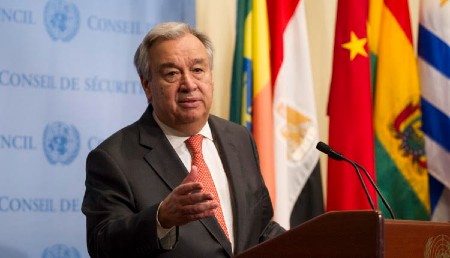BUENOS AIRES, Argentina – United Nations Secretary General, António Guterres, Wednesday commended the leadership of the countries of Latin America and the Caribbean on climate action adding that he was counting on them to send a strong signal to the 26th UN Climate Change Conference (COP26) that it is possible to achieve a resilient net zero future.
 United Nations Secretary General, António Guterres“We need to act together to overcome the current impasse”, Guterres said as addressed the virtual High-Level Dialogue on Climate Action in the Americas. The COP26 will be held October 31 to November 12 in Scotland’s largest city, Glasgow.
United Nations Secretary General, António Guterres“We need to act together to overcome the current impasse”, Guterres said as addressed the virtual High-Level Dialogue on Climate Action in the Americas. The COP26 will be held October 31 to November 12 in Scotland’s largest city, Glasgow.
Guterres told the conference that countries in the region were already showing their ambition in reducing greenhouse gas emissions and adapting to climatic change, even as they grapple with the social and economic effects of the coronavirus (COVID-19) pandemic.
He also pledged “the full support of the United Nations system to address the triple threat of COVID-19, climate change and debt”.
The one day event is being hosted by the government of Argentina, and brings together countries in the Americas to discuss shared commitment to enhancing climate ambition.
The dialogue will build further momentum for climate action ahead of the 26th UN Climate Change Conference (COP26), which will be held October 31 to November 12, 2021, in Glasgow, Scotland.
The virtual conference is being co-organized by the governments of Argentina, Barbados, Chile, Colombia, Costa Rica, the Dominican Republic, and Panama, and will include interventions from governments, the private and financial sectors, development banks, academia, and civil society organizations.
The dialogue will include panel discussions on topics including enhancing climate ambition on the road to Glasgow, accelerating climate action through regional cooperation, and strengthening adaptation and resilience to the impacts of climate change.
In his address, Guterres highlighted three essential areas that need immediate action. He said the first is to keep the 1.5 degrees Celsius above pre-industrial levels target within reach, noting at present, the world is “a long way from achieving it”.
He gave several examples of how that can be accomplished, such as achieving net zero emissions by 2050 and phasing out the use of coal no later than 2030 for Organization for Economic Cooperation and Development (OECD) countries, and by 2040 for all others.
The UN Secretary General also said that “a just transition means ensuring that workers in high-carbon and fossil fuel-related sectors have decent alternative options, are supported for retraining, and have social safety nets”.
He said that the second area would call for a breakthrough on adaptation and resilience and called on donors and multilateral development banks to allocate at least 50 per cent of their climate finance to this end. Currently, only 21 per cent is devoted to it.
Developing countries already need around US$70 billion dollars a year to adapt to these changes. That figure could more than quadruple by the end of this decade.
Guterres said the third essential area would result in developed countries delivering on the solidarity agenda.
“That means support to developing countries on vaccines, debt and liquidity, as well as climate finance,” he said.
Guterres said in order to achieve that goal, the world needs “a credible plan” for delivering on the US$100 billion dollar commitment made over a decade ago, and multilateral development banks have to align their portfolios with the 1.5 degrees goal.


